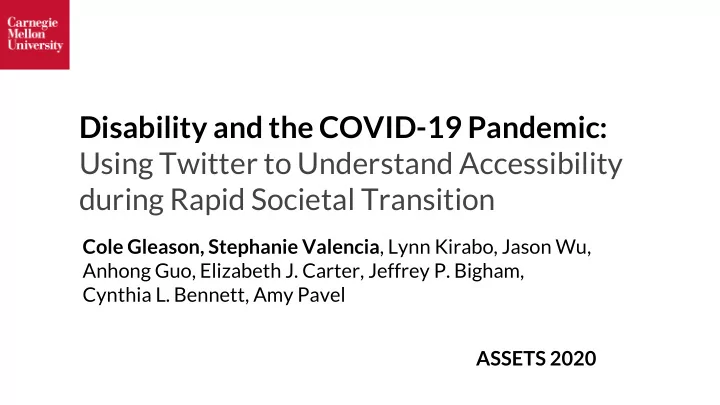

Disability and the COVID-19 Pandemic: Using Twitter to Understand Accessibility during Rapid Societal Transition Cole Gleason, Stephanie Valencia , Lynn Kirabo, Jason Wu, Anhong Guo, Elizabeth J. Carter, Jeffrey P. Bigham, Cynthia L. Bennett, Amy Pavel ASSETS 2020
CORON CORONAVIRU RUS COV COVID-19 19
Turning to Social Media We turned to Twitter to understand how the pandemic affected accessibility People use social media to find and share local information in crises, such as Hurricane Sandy [Maria Kogan et al. 2015] People with disabilities, especially communication disabilities or who are deaf do this as well [John T. Morris et al. 2014]
April 6 - 12: General Search Used 59 general terms ● 3,375 resulting tweets ●
Domains Public Health Messaging Product Delivery Online Education
April 16-22: Domain Specific Search April 6 - 12: General Search Grocery Delivery: 7,877 Used 59 general terms ● ● Education: 1,244 3,375 resulting tweets ● ● Public Health Messaging: 544 ●
FINDINGS
What do tweets reveal about product delivery? ● Offering mutual aid ● Unable to get products: ○ Few slots ○ Narrow high-risk group prioritization ● Requesting help ● Advocating and sharing critiques
What do tweets reveal about online education? ● Advocating for education access ● Sharing resources to make content accessible ● Unpreparedness of institutions, need for universal design approach. ● Accommodations availability changed for the pandemic but were hard to get before
What do tweets reveal about public health messaging? ● Visual info did not have alternative text descriptions. ○ 12 out of 55 health dept. accounts used alt text. ○ 48 of 50 COVID websites inaccessible [The Markup 2020] Sign Language at COVID briefings ● Tactile Version
Existing problems Existing solutions magnified by pandemic no emergency plan ● Lack of funds for basic needs ● Similar: prior work on no ● Accessible content online consideration for access in emergency plans Emergency measures Improvements to access not considering accessibility but took a pandemic to get there ● Inaccessible signs in stores ● Remote learning/work now allowed ● Inaccessible video platforms for ● Must ensure these remain in place online education after pandemic is over
Thank you! Contact Us: svalencia@cmu.edu | @svaleval cgleason@cmu.edu | @colegleason Paper: bit.ly/Disability-COVID-on-Twitter I llustrations by: https://stories.freepik.com
Recommend
More recommend